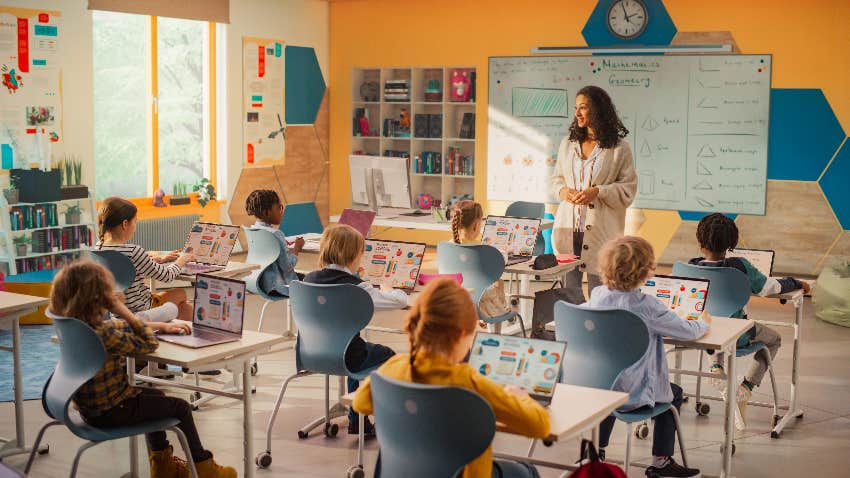I Homeschool My Kids Because Public Education Breeds Passive Drones — 'I Don't Want To Raise Little Worker Bees'
I want to raise children who can think for themselves.
 Comstock Images | Canva
Comstock Images | Canva Editor's Note: This is a part of YourTango's Opinion section where individual authors can provide varying perspectives for wide-ranging political, social, and personal commentary on issues.
We homeschool our kids. I can make up a lot of reasons why: We want more time together as a family. We want to keep the kids sheltered for a while longer. Our ADHD son will learn better at home. We want more time for art projects.
These reasons are partially true. But really, I homeschool because I don’t want to raise passive little worker bees who will grow up to do and buy what they're told. And that’s what public school is engineered to churn out.
I love public school students. I support public school teachers (the good ones, anyway). I believe public school parents are doing the best they can for their kids. This is not about the people in the system. It’s about the system itself.
I'm homeschooling my kids because public school is designed to create obedient workers who don’t think outside of their narrow worldview.
 Gorodenkoff / Shutterstock
Gorodenkoff / Shutterstock
Don’t believe me? Think back to school. You needed a pass to go to the bathroom. You couldn’t eat in class.
You had to ask for a pass to get a drink of water. You had a dress code. The school controls you, first, bodily. It tells you when to eat and when to eliminate; what to wear and how to wear it. The physicality of control is total, even teaching children to sit still for up to eight hours a day.
And for what? School is underpinned by a system of arbitrary rules. Use cursive here, print here. Go to your locker at designated times. Don’t use the pencil sharpener — in fact, don’t use a pencil.
No one asks why Mr. Jones won’t let his class wear hats in school; they simply obey. All of these rules prime students for unquestioning obedience to bosses and other authority figures, including the government.
Public schools also prime them for surveillance by those authority figures. At school, students assume they’re being watched all the time; this is what prevents everything from cheating to dress code violations to smoking in the bathroom.
Because students outnumber teachers, the administration must create an atmosphere of internalized surveillance: students never know if they’re being watched, and so always act as if they are.
This internalized surveillance system sets students up as easily controlled workers who will obey the rules with minimal supervision and threats.
But because the overseers are the same ones handing out punishment, they have no real sense of accountability (unless parents come howling in, and maybe even not then). So it makes sense to students that surveillance is only for the controlled, not for the higher echelons.
Police dash cams make a lot less sense in this mindset. So do checks and balances of political power. Even Human Resources becomes impotent.
An emphasis on testing goes hand-in-hand with this surveillance. Students are often subjected to standardized tests multiple times a year — tests with no bearing on their grades or class standing. These ready students for arbitrary reviews.
 EF Stock / Shutterstock
EF Stock / Shutterstock
Public schools also set them up to accept random, nonsensical metrics of performance. As an ultimate form of surveillance, the tests teach students to assume they’re always being evaluated by some distant other: in the tests’ case, the state; and later, corporate headquarters.
People often complain about schools “teaching to the test.” And they do teach to the test: their own. Knowledge is broken into discrete subjects (English, History, etc.) without any relationship to one another.
Because learning is so segregated, students don’t delve deeply into subjects. They don’t have time to follow their interests or inclinations. Instead, students are forced-marched through a shallow sea of knowledge — and kids know it, with their constant “Will this be on the test?”
Those tests, generally written, often fill-in-the-blank or multiple-choice, emphasize conformity.
There’s no room for ambiguity about why Columbus discovered America, for example, because the answer needs to be easily regurgitated for the always-looming test. Schools don’t reward creative thinking; within the system, they can’t.
You can’t even evaluate, much less reward, a multidisciplinary project that renders history into play form. And all learning must be evaluated. You can’t read a book for fun.
All of this alone would convince me not to enroll my children. But the creeping corporate influence makes schools even more dangerous.
Now morning news shows advertise products; Pepsi and Coke fight over contracts for the school cafeteria. One or the other may sponsor parts of the building in exchange for ad space. We accept this capitalist intrusion into our schools because it’s the end goal of our learning system: go forth and buy the stuff you don't need.
Corporations want to get ‘em while they’re young. And they are — they use kids as brand ambassadors. The latest fads sweep through schools in a kind of groupthink. Corporations don’t need to advertise in schools when they can saturate the adolescent media market.
Students who choose not to participate become social outcasts, or at least feel somehow less than. Not buying into the corporate-engineered culture can get a kid ostracized. I’m lucky to be in a position to opt-out. Most parents can’t.
That sucks, and I don’t judge them for that. But I’m making what I believe to be the best decision for my kids. It’s an unpopular one.
So I won't be enrolling my kids in public school because I don’t want to raise a bunch of conformist drones primed for desk jobs in the new economy.
I want my kids to have a chance to think deeply, to learn without testing, and to avoid the corporate influence already infiltrating our schools. I want them to question the authority around them, its foundations, and its utility.
If this information makes you react strongly, take a step back and ask why. Think hard about the truth in it without dismissing the argument as a corporate conspiracy theory.
Examine your reaction, and where it comes from. Do we have to do school this way? Why? Can we change it? How?
As for us, we're opting out.
Elizabeth Broadbent is a writer, journalist, and speculative fiction author. Her work has been featured in Huffington Post, The Washington Post, Insider, and Romper among many others, where she writes about parenting, mental health, and lifestyle topics.

